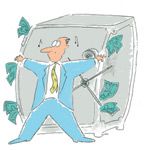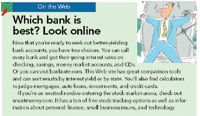8 tips that banks don't want you to know
Manage your funds, earn more interest, and get better service starting right now.
New service charges, confusing account options, and wildly varying interest rates are just a few of the techniques banks are using to improve their bottom line these days—at your expense. How bad is it? One former bank executive estimates that during the average consumer's lifetime, he or she will likely overpay tens of thousands of dollars in service charges, mortgage fees, credit card interest, business loans, and checking and savings account fees. But this won't happen to your veterinary practice—no way. It's time to get some of your hard-earned money back by beating banks at their own game. Here's how to do it:
1. Never put a dime into a savings account
With the measly interest rates that commercial banks pay on passbook savings accounts these days, you're guaranteed to lose money after you factor in inflation. If you keep operating cash in a savings account, close it right now and transfer it to a money market account. That's where your money will really pull its weight and start to yield substantially more interest.

The same goes for your checking accounts. You want to keep the least amount of money in checking that you can and still make certain that you never overdraw it. The best way to do that is ...
2. Never make a deposit directly into a checking account
Ask your bank to link your checking account to that brand new money market account you just opened. Then set up your checking account so you can make phone or online transfers between the two accounts. Make all your deposits directly into the money market account and transfer cash into the checking account only when you need it. Keeping the most money possible in the money market account at all times will mean more interest for you.
If you've never tried transferring funds online or by phone, don't worry—it's simple and quick. Your bank representative can sign you up for the service—if necessary—and show you how to use the service.
3. Invest cash you don't need right now in CDs
For faint-of-heart investors, certificates of deposit (CDs) are a good alternative to riskier investments.
One way to maximize your investment in CDs is to break up your total kitty into several equal parts and invest them in CDs with staggered maturity dates. This "laddering" technique lets you take advantage of relatively high interest rates while ensuring that a matured CD and its penalty-free cash are never far away.
4. Never let a maturing CD roll over automatically
If I've sold you on CDs, here's my next tip: Always call or visit the bank and ask to review all of its current interest rates, including any promotional rates, before you renew. An automatic renewal is practically guaranteed to get you something less than the bank's best available interest rate.
5. Never go with the first offer
Shop around before you sign. Bank deregulation has produced a competitive environment with differing interest rates and charges. If you can find a better deal than your current bank is offering, take it. Don't stick with a bank that isn't competitive.

Which bank is best? Look online
6. Never overdraw
Some banks make customers pay big penalties for small errors. Let's say you accidentally overdraw your business checking account. You have $300 in the account and you write three checks in one day. The first is for $10, the second for $20, and the third for $320. Some banks process checks in order of size, not in the order they received them. In such a case, the bank would process the $320 check first. That would mean all three checks, not just one, would bounce. Then you'd be hit with three separate bad check penalties, and many banks charge as much as $35 for each overdrawn check. You can always try calling the bank and asking to have some or all of the charges reversed—they may be especially receptive if you're a good customer—but you'll save yourself time and aggravation by not overdrawing in the first place.
7. Don't get taken in by ATMs
When ATMs were first introduced, banks enticed us to use them by trumpeting how convenient and time-saving it would be to use cards and pin numbers instead of waiting in line for a live teller. What's more, the new ATMs would be entirely free. And banks saved money on payroll with fewer tellers.
Millions of us took the bait. ATMs became almost as familiar as stop signs. Once the public was hooked, the predictable happened. Some anonymous executive had a new moneymaking idea: Banks would charge customers when they used ATMs owned by other financial institutions.
Nearly every bank in town cut itself in for a piece of the pie. At last count, more than 90 percent were assessing ATM surcharges. The fees now average from $1 to $2 per transaction.
If you're being charged for using out-of-system ATMs, stop now. Cut up your ATM card and resume that old-fashioned practice of stepping inside the bank to transact your business.
Is this an unthinkable step backward? Absolutely not. Dumping your ATM card can be a marvelously liberating experience, requiring nothing more than a slight change in your schedule. With banks' extended hours, finding time to visit in person is an easy step to take. You may find that the line for the ATM machine is longer than the line for a teller.
If the idea of going cold turkey on using ATMs sets you gasping in panic, visit bankrate.com and read up on banks and ATM fees. Knowing the facts will help keep your bank's fingers out of your practice's pockets. Don't let your bank charge you for withdrawing your own money.
8. Go with David, not Goliath
Bigger isn't always better. If you use a big bank, ask yourself: Do the tellers treat me well? Does the bank exercise economies of scale to bring me superior service? My experience shows that many of these megabanks resulting from merger mania are actually increasing inefficiency and alienating customers.
Don't worry, though. Solving this frustrating problem is relatively painless. Just search out the smallest FDIC member bank in your neighborhood and give it your business. Small banks will be happy to have you as a customer. They'll appreciate you. You'll receive more personal attention from a small neighborhood bank than you ever will at a financial behemoth.
Following these tips—even at a small, friendly bank—will mean fewer frustrations and leave you better prepared to enjoy your stroll down the path to greater riches and superior practice money management.
William J. Lynott is a freelance writer and management consultant in Abington, Pa., specializing in business and financial topics. Send comments or questions tove@advanstar.com